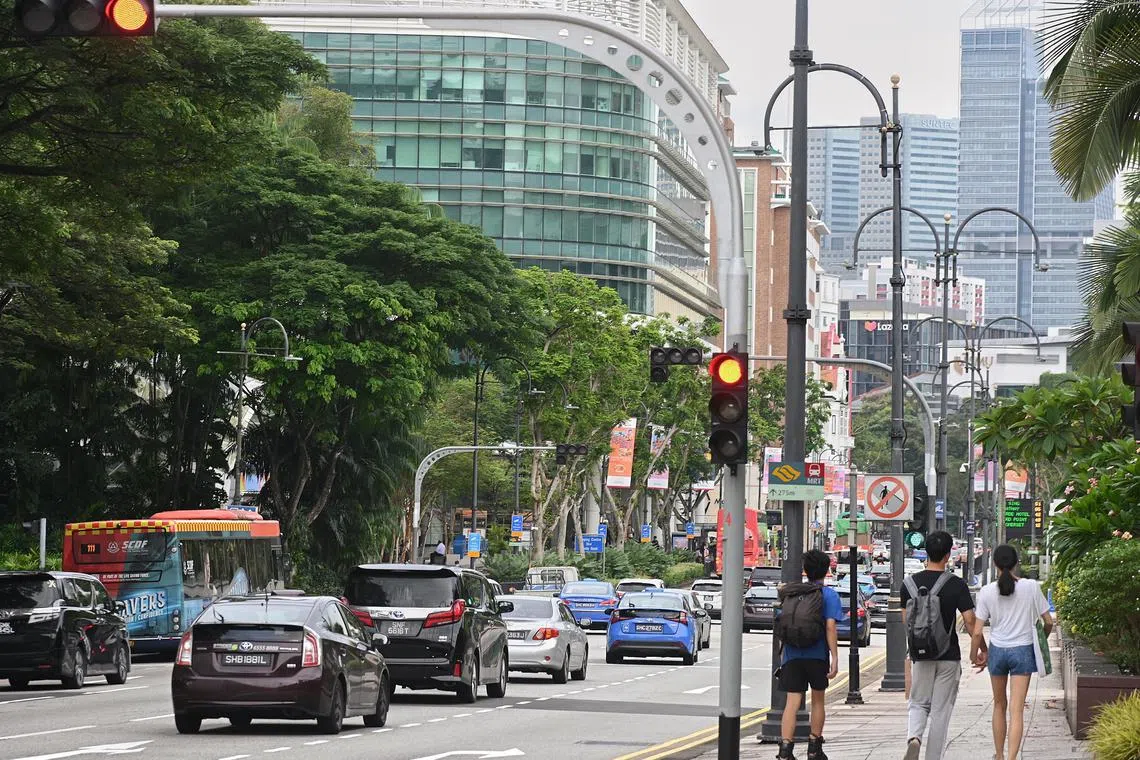Prime Orchard Road retail rents get boost from tourism rebound
Sign up now: Get ST's newsletters delivered to your inbox

Retail rents in Orchard Road continued to recover in the fourth quarter of 2022, as travel and leisure demand bounced back.
ST PHOTO: DESMOND WEE
SINGAPORE – Retail rents in Singapore’s prime shopping belt continued to recover in the fourth quarter of 2022, as travel and leisure demand bounced back.
In a report out on Thursday, real estate consultancy Edmund Tie said landlords of prime first-storey retail space in the Orchard Road area raised their rents by 7.4 per cent year on year to an average of $39.20 per sq ft per month (psf pm) in the fourth quarter – making for the strongest year-on-year growth for the whole of 2022.
This is a 2.1 per cent increase from the $38.40 psf pm posted in the third quarter.
Rents of retail spaces in other sub-markets also grew as shopping traffic returned, although at a slower pace. Data from Edmund Tie showed that retail rents of prime first-storey retail spaces in fringe and suburban areas rose by 6.7 per cent from the fourth quarter of 2021 to an average of $33.10 psf pm. Quarter on quarter, the increase was 1.5 per cent.
Rents in other city areas went up by 3.7 per cent year on year to $19.20 psf pm on average, and by 1 per cent quarter on quarter.
Data from other property consultancies point to a similar uptrend, fuelled by a robust recovery in the Republic’s tourism sector.
According to Knight Frank Singapore, prime retail rents islandwide averaged $26.10 psf pm, a 1.7 per cent quarter-on-quarter growth in the fourth quarter of 2022 and a total increase of 2.6 per cent for the entire year.
Within Singapore’s central region, the Orchard area experienced the largest growth of 2.2 per cent quarter on quarter to $29.10 psf pm, an increase of 3.1 per cent since the fourth quarter of 2021.
In comparison, the average rent in the Marina Centre, City Hall and Bugis areas chalked up a 1.8 per cent rise to $23.90 psf pm quarter on quarter, and a 2.6 per cent increase for 2022.
Said Mr Ethan Hsu, head of retail at Knight Frank Singapore: “Despite many Singaporeans travelling out of the city for the holidays, the uptick in local consumers and foreign visitors palpably signified global accord of a return to normality in an endemic world, ushering in a new wave of confidence for both retailers and landlords.”
A recent CBRE report highlighted that leasing activity had also picked up in the fourth quarter of 2022, driven mostly by food and beverage (F&B) operators, particularly in locations near or within hotels seeking to capitalise on increased tourist traffic.
Jewellery and watch stores also increased their presence in the fourth quarter as sales continued to grow, fuelled in part by revenge consumption and higher savings during the pandemic, noted CBRE in its report.
The sector also saw several new-to-market brands establish a foothold in Singapore. These include Anglo-French luxury fragrance house Creed at Raffles City Shopping Centre, Cafe Kitsune by French-Japanese lifestyle brand Maison Kitsune convenience store chain Emart24 at Jurong Point and Nex.
CBRE also pointed out that various local brands continued to expand beyond Singapore’s shores – including fashion house Charles & Keith, furniture retailer Castlery, and F&B chain operator Paradise Group.
Thus, said the CBRE team, “landlords and owners of retail space should be increasingly more receptive and sanguine in leasing out prime mall spaces to further encourage and support the growth of these home-grown brands”.
Mr Lam Chern Woon, Edmund Tie’s head of research and consulting, expects demand for retail space to expand as the sector continues its recovery.
“With the bulk of the supply pipeline between 2022 and 2025 targeted to come on stream in 2023, including The Woodleigh Mall and One Holland Village shops, the supply-demand dynamics are expected to be balanced in 2023,” he said.
Still, he noted that there are “considerable headwinds” in the coming year, which might reduce consumer spending and cap rental growth.
CBRE, too, cautioned that retailers may face some challenges in the shorter term, such as manpower shortages, higher operating costs, competition with e-commerce brands, and the increase in goods and services tax.
Even so, Knight Frank’s Mr Hsu highlighted that the retail sector remains in a “much better position”, especially when compared with when the Covid-19 pandemic was raging.
“So long as there are no size limits to gatherings and quarantine requirements for cross-border arrivals, prime rents of retail spaces are likely to grow between 3 per cent and 5 per cent for the whole of 2023, with the prime shopping belt Orchard Road leading the recovery,” he said. THE BUSINESS TIMES


